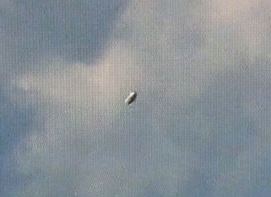Experts: This is not a bird, not a bug, not a plane … just what is it?
The UFO reported earlier this month in Denver stirred up a lot of controversy, with outspoken critics insisting that a mere bug was to blame for the hubbub. Discovery News issued a token response on behalf of the skeptical standpoint, whitewashing KDVR’s report with a number of well-known, and sadly quite effective, debunking tactics designed to muddle public perception of “unorthodox” phenomena.
Correctly, Discovery News pointed out that KDVR should have consulted an entomologist to confirm that the UFO was a common insect – but the Discovery reporter subsequently avoids talking to an insect expert, instead reinforcing his baseless explanation by stating categorically that “if you realize that the UFOs look identical to flying insects, the mystery vanishes.” The UFOs look identical to bugs? Just what would an entomologist say, after all?
Heidi Hemmat of KDVR, the reporter who broke the story, last week aired a followup report to answer the critics by actually speaking with a professional entomologist about what was caught on video. Still, after scrutinising the footage, the expert believes that the Denver UFO is not an insect. Yet even this won’t satisfy the armchair detractors, who still insist a bug is to blame for the excitement.
Although consulting a “bug expert” is an important step, we must acknowledge that in the case of video evidence, even an entomologist’s opinion is just that – an opinion. Without a full analysis of the available footage, which would require complicated calculations of speed and distance based on the assumption that the UFO is an insect, taking into consideration the number of frames per second that elapse between “blips,” we have to take the entomologist’s statement with a grain of salt.
The bottom line is that we still don’t have enough evidence one way or another to call this case closed. I contacted Hemmat with a suggestion she probably received from a number of other UFO researchers as well: simply set up two cameras, say 50 feet apart, both trained on the area where the UFO has been videoed before. If bugs are to blame, each camera should capture images of different bugs at best – but if the Denver UFO is a larger, more distant object, then we should see the same UFO at the same time on both videos. Hemmat gave a nod to this dual-video suggestion at the end of her report, and even invited others to pull together such a study, but she left it at that.
It seems prudent that KDVR at least make an attempt to substantiate, with stronger video evidence, what the entomologist has asserted. In lieu of additional followup from KDVR, we can only hope that another reporting agency has the interest, time, and equipment to pursue the dual-camera test. But with interest subsiding in the absence of new evidence, the case of Denver UFO may never be truly solved.
STACE TUSSEL COLLIGAN
